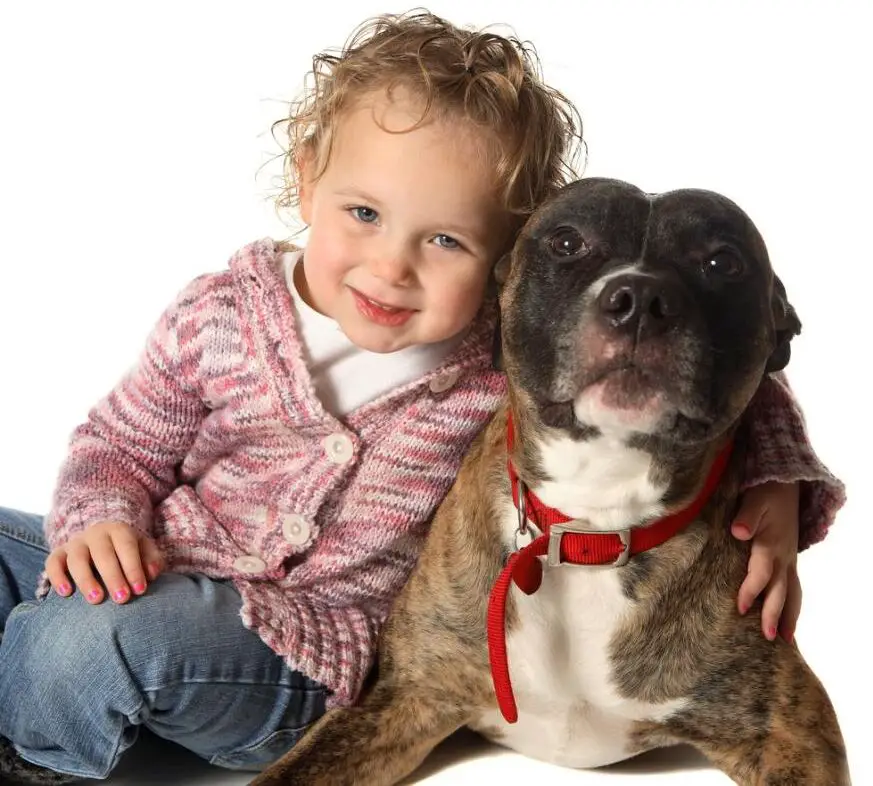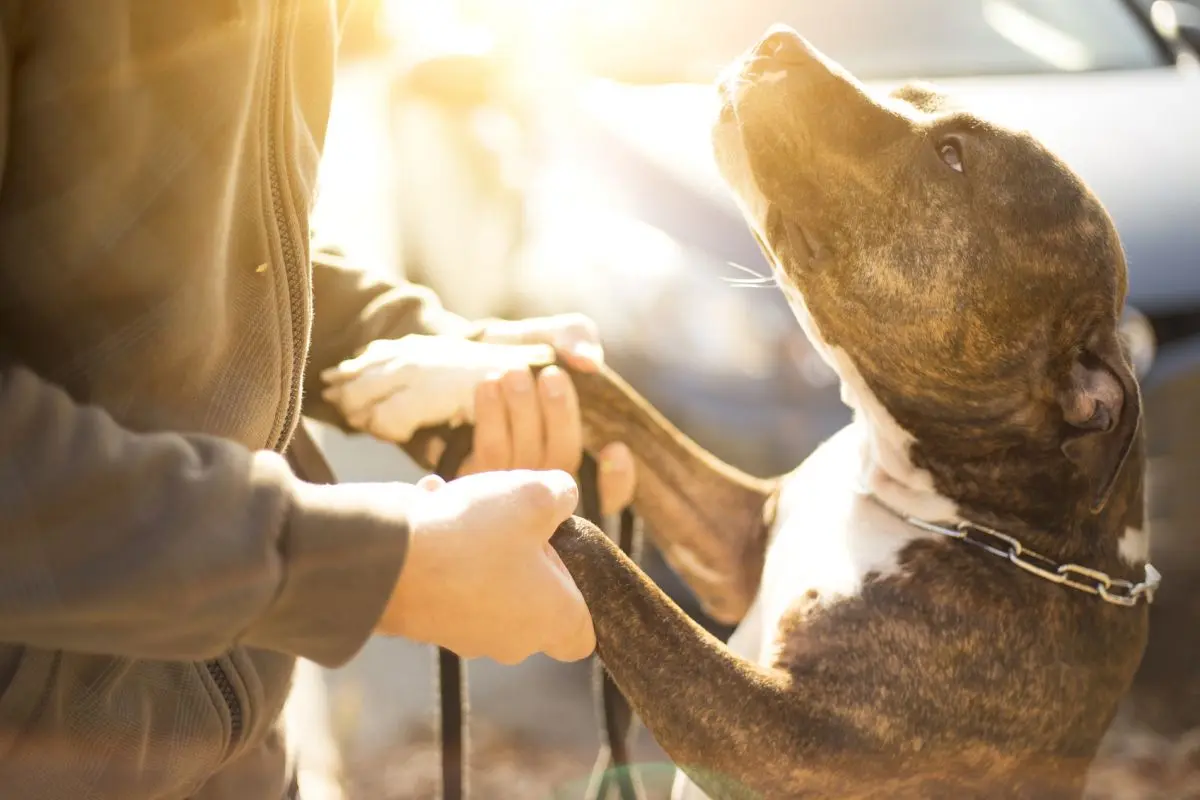Pit bulls, often misunderstood and surrounded by misconceptions, are the subjects of numerous myths that have fueled stereotypes about their behavior and temperament.
In this article, we will debunk some of these myths about pit bulls, setting the record straight for this amazing breed of dogs.
Here Are the 5 Most Common Myths About Pit Bull:
- Locking Jaws of Pit Bull
- One Cannot Predict a Pit Bull’s Next Move
- Don’t Keep Pit Bulls Around Other Animals
- You Should Muzzle Pit Bulls in Public
- You Can’t Train a Pit Bull
[toc]

Myth 1: Locking Jaws of Pit Bull
Why Does This Myth Exist?
Some people think pit bulls have jaws that can lock because of how they’re shown in movies and news. They’re often shown as powerful and maybe scary dogs.
The idea probably came from knowing pit bulls have strong jaws like many other dogs. But there’s no special ability for their jaws to lock. It’s just that they have a strong bite like other dogs.
Debunking the Myth:
Pit bulls don’t have a special jaw that locks! Science and animal experts say all dogs, including pit bulls, have similar jaws.
Some people might’ve thought this because pit bulls were bred for strength in dog fights.
See, the idea that pit bulls have a lock-jaw comes from their past of dog fighting. In those times, they were chosen for being strong and tough.
But, it’s important to know the real facts! Pit bulls aren’t different from other dogs. We should use real information to understand them better and be good pet owners.
Myth 2: All Pit Bulls Are Aggressive
Why Does This Myth Exist?
There is this common perception that all pit bulls are aggressive because of how the media usually talks about them.
Similarly, when aggressive behavior is observed in a pit bull, it often gets more attention than similar behavior in other breeds, contributing to the perception that aggression is inherent in the breed.
Debunking the Myth:
The truth is that a dog’s temperament is influenced by various factors, including genetics, upbringing, training, and socialization.
Numerous pit bulls are friendly, loving, and gentle pets when raised and trained in a positive environment with responsible owners.
Generalizing an entire breed as aggressive oversimplifies a complex issue and overlooks the individuality of dogs.
Myth 3: You Can’t Trust Pit Bulls With Children
Why Does This Myth Exist?
The myth that you can’t trust pit bulls with children exists due to a combination of biased portrayals in the media and isolated incidents that have gained much attention.
Debunking the Myth
The truth is, that pit bulls can make fantastic family pets. When they grow up in a caring and safe home, they can be loyal and loving towards children.
It’s important to remember that each dog is different, so it’s more about how they’re raised, trained, and socialized than just their breed.
Myth 4: One Cannot Predict a Pit Bull’s Next Move
Why Does This Myth Exist?
There is this notion that pit bulls are unpredictable because they don’t know how dogs behave and rely on what they’ve heard.
The news usually talks about the worst situations, making it seem like pit bulls are always dangerous.
That can make everyone think all pit bulls are like that.
Debunking the Myth
Predicting a dog’s behavior, including that of pit bulls, is possible through proper training, socialization, and understanding of the individual dog’s needs.
Indeed, responsible ownership is key in shaping a dog’s behavior.
With proper care and attention, pit bulls can be dependable and affectionate companions, disproving the mistaken belief that they’re unpredictable.
Myth 5: Pit Bulls Have a Specific “Look”
Why Does This Myth Exist?
“Pit Bull” is a term that covers various breeds like the American Pit Bull Terrier, American Staffordshire Terrier, and Staffordshire Bull Terrier.
These breeds differ a lot in how they look.
When people and the media mistake one for another, it adds to the myth that pit bulls have a set and obvious appearance.
Debunking the Myth:
It’s important to understand that pit bulls come in different shapes and colors. People often make mistakes in identifying them, which leads to wrong ideas about how they behave.
We should recognize and appreciate the diversity within the pit bull group, as they can look very different from one another.
Myth 6: There is a Higher Likelihood of Pit Bulls Turning on Their Owners
Why Does This Myth Exist?
People might wrongly think that pit bulls are more likely to harm their owners, often because the media focuses a lot on isolated incidents involving them.
The media’s exaggerated coverage of pit bull incidents might make it seem like they’re more prone to aggression toward their owners, but it’s important to consider the bigger picture.
Debunking the Myth
Many pit bulls happily live in harmony with their owners, demonstrating loyalty and affection.
Just like any dog, their actions are shaped by factors such as training, socialization, and the environment they grow up in.
Being a responsible pit bull owner means comprehending and fulfilling the dog’s needs while building a positive relationship.
Thinking that a certain breed is naturally aggressive is not the right approach.
It ignores how each dog is different and how their behavior is influenced by their own nature and the things around them.
Myth 7: First-Time Dog Owners Shouldn’t Choose Pit Bulls
Why Does This Myth Exist?
Some individuals think that if you’re getting a dog for the first time, you shouldn’t pick a pit bull.
This idea comes from misunderstandings and negative beliefs about pit bulls that they are difficult to handle.
Debunking the Myth
With proper guidance, commitment, and responsible ownership, pit bulls can be suitable for first-time dog owners. Many pit bulls are known for their loyalty, intelligence, and adaptability.
Enough training, socializing, and a caring environment play a big part in creating a good relationship between a dog and its owner.
It’s crucial to think about the individual dog’s personality instead of making broad assumptions about whether a certain breed is right for particular owners.
Myth 8: Don’t Keep Pit Bulls Around Other Animals
Why Does This Myth Exist?
Some folks believe pit bulls shouldn’t be around other animals because they misunderstand pit bulls’ body language.
They might not know that dogs, including pit bulls, have ways of talking without barking.
This misunderstanding makes some think pit bulls can’t be with other animals, even though it’s not true.
Debunking the Myth
Many pit bulls happily live with other animals in the same house, especially when the introduction is calm and positive.
Being a responsible owner means understanding your dog’s behavior and preferences. Use positive training methods, like rewarding good behavior, to build a strong connection between your pit bull and other pets.
It’s important to let them meet in a safe and supervised space, giving them time to get used to each other.
Making sure your pit bull gets regular exercise and mental stimulation helps keep them balanced and content, reducing the chances of any behavior issues.
Myth 9: Pit Bulls Are Overly Muscular and Powerful
Why Does This Myth Exist?
This myth is around because people link pit bulls with being really muscular and strong, mainly because of how they look.
The breed’s sturdy and athletic build can make it seem like they’re overly muscular and powerful.
Debunking the Myth:
While pit bulls are indeed strong dogs, their physical appearance varies widely within the breed.
Not all pit bulls are overly muscular, and individual characteristics depend on factors such as genetics and overall health.
Myth 10: You Should Muzzle Pit Bulls in Public
Why Does This Myth Exist?
Pit bulls should wear muzzles in public, this idea comes from a mix of things. In movies and news, they often show pit bulls as if they’re troublemakers, making people feel scared.
Also, old ideas about pit bulls being naturally dangerous add to the belief that muzzling them is needed to keep everyone safe.
Debunking the Myth:
Being a good owner, training your pit bull well, and letting them socialize can often mean they don’t need a muzzle.
It’s not right to say all pit bulls should wear muzzles. It should be decided depending on how each dog behaves and what they need.
It’s important to remember that promoting positive interactions and fixing any behavior issues through training is a part of being a responsible pit bull owner.
Myth 11: Only Irresponsible People Own Pit Bulls
Why Does This Myth Exist?
This false idea, like other myths, might also come from TV shows and documentaries that wrongly label pit bulls as aggressive.
When people see this on screen, they might think if someone owns a pit bull, they don’t care much about the safety of others
Debunking the Myth
Responsible pit bull ownership is not limited to a specific group of people; individuals from various backgrounds can be great owners.
Being a responsible owner goes beyond the dog’s breed and includes things like education, commitment, and understanding the unique needs of a dog.
Labeling pit bull owners as irresponsible makes things too simple and creates unfair biases against both the breed and its owners.
Myth 12: Pit Bulls Are Not Good Therapy or Service Dogs
Why Does This Myth Exist?
This notion may be rooted in misconceptions about pit bulls’ temperament and the belief that certain breeds are unsuitable for therapy or service work.
Media portrayals emphasizing negative incidents involving pit bulls may contribute to this stereotype.
Debunking the Myth
A lot of pit bulls have shown they can be fantastic therapy and service dogs, demonstrating how adaptable and empathetic they can be.
Deciding if a pit bull is right for therapy or service work depends on its personality, training, and ability to do certain tasks.
Thinking that all dogs of a certain breed can or can’t do something ignores the positive things pit bulls can bring to therapy and service situations.
Myth 13: You Can’t Train a Pit Bull
Why Does This Myth Exist?
This view that you can’t train a pit bull might come from their appearance, which some people see as stubborn and aggressive.
Additionally, incidents portrayed in the media, where pit bulls seem to turn on their owners, could contribute to this impression.
Debunking the Myth
This idea that you can’t train pit bulls is not true. Pit bulls can be trained just like any other dog.
It depends on how much time and effort the owner puts in, using positive methods and understanding what the dog needs.
Pit bulls are smart and like making their owners happy, so they can learn commands and good behavior.
With the right training and care, pit bulls can be well-behaved and good pets. Saying they can’t be trained is just not true.
Myth 14: Likelihood of Biting in Pit Bulls
Why Does This Myth Exist?
You may see people believing that pit bulls are more likely to bite because, as mentioned earlier, some were trained for dogfighting in the past.
This history, along with their negative portrayal on screen, can make people think that pit bulls are aggressive and likely to bite.
Debunking the Myth
How a dog behaves, including biting, isn’t just because of its breed. Dogs, like people, have their own personalities.
Some pit bulls might be reserved and peace-loving, while others can be really outgoing and hyperactive.
Whether a dog bites or not depends on how it was trained, how it grew up, and the experiences it had. So, it’s more about how the owner takes care of and teaches their dog.
Myth 15: There Is a High Pain Tolerance in Pit Bulls
Why Does This Myth Exist?
The misconception that pit bulls can endure a lot of pain might come from misunderstandings about the breed’s perceived strength and resilience.
This idea can also be linked to the breed’s history in dog fighting and the mistaken belief that pit bulls don’t feel pain as much as other dogs do.
Debunking the Myth:
Even though pit bulls are strong and resilient, it doesn’t mean they automatically have a higher tolerance for pain.
How a dog reacts to pain depends on things like their genes, health, and personality. Owners have a big job of watching out for their dog’s pain.
Good owners, no matter the breed, make sure their pets get the right care from the vet when they need it.
Myth 16: You Can’t Expect Loyalty from Pit Bulls
Why Does This Myth Exist?
Most humans might think pit bulls aren’t loyal because they hear wrong information and believe stereotypes.
If someone thinks pit bulls can’t be loyal, they might not try hard to build a good connection with the dog, leading to a very generalized view that pit bulls can’t be loyal.
Also, if they’re scared or don’t know much about pit bulls, they might not understand the dog’s behavior, making the myth seem more and more true to them.
Debunking the Myth
Pit bulls are known for their loyalty and devotion to their owners. They thrive on positive interactions, affection, and consistent care.
Many pit bulls form deep emotional connections with their families, dispelling this very myth that they lack loyalty.
Understanding and appreciating the breed’s loyalty contributes to having a positive relationship between pit bulls and their owners.
Myth 17: Handling a Pit Bull Isn’t Easy
Why Does This Myth Exist?
People might assume that pit bulls are hard to handle because they see them as strong and aggressive in stereotypes.
On-screen, they’re often shown as unruly and tough to manage, adding to this idea.
This misconception makes it tough for responsible owners to deal with these challenges.
Debunking the Myth
Proper training and socialization are key factors in managing and handling pit bulls effectively.
With consistent guidance and positive reinforcement, pit bulls can become well-behaved and responsive companions.
Responsible ownership involves understanding the breed’s characteristics and addressing any behavioral challenges through training.
Myth 18: All Pit Bulls Are the Same
Why Does This Myth Exist?
The misunderstanding that all pit bulls are the same may arise from a lack of knowledge and understanding about the diversity within the pit bull breed.
Debunking the Myth
Different breeds, including the American Pit Bull Terrier, American Staffordshire Terrier, and Staffordshire Bull Terrier, fall under the “pit bull” umbrella, each with unique characteristics.
Additionally, individual upbringing, genetics, and environmental factors contribute to variations in temperament.
Likewise, taking good care of a pit bull involves being a responsible owner, giving them proper training, and creating a caring environment.
These things can make a positive difference in a pit bull’s behavior.
Myth 19: Pit Bulls Are Not Good with Other Dogs
Why Does This Myth Exist?
The belief that pit bulls are not good with other dogs may arise from stereotypes about their perceived aggression and history of dog fighting.
Debunking the Myth
Many pit bulls can get along well with other dogs when they are properly socialized.
This involves introducing them to various social settings early on, making sure introductions to other dogs are controlled, and using positive reinforcement.
Families who focus on socializing their pit bulls challenge the mistaken idea that they don’t get along with other dogs.
Myth 20: For Apartment Living, Pit Bulls Are a Bad Choice
Why Does This Myth Exist?
The myth that pit bulls are a poor choice for apartment living might stem from various factors.
Misconceptions about their energy levels, size, and perceived aggression, and unpredictability contribute to this belief.
Debunking the Myth
Pit bulls can adapt well to apartment living with the right care and attention.
Regular exercise, mental stimulation, and consistent training contribute to a well-behaved and content pit bull in an apartment setting.
Pit bull owners who meet their dog’s needs can successfully challenge the misconception that pit bulls are unsuitable for apartment living, highlighting the breed’s adaptability and versatility.
Myth 21: Pit Bulls Are Naturally Inclined to Attack People
Why Does This Myth Exist?
The term “pit bull” encompasses multiple breeds, and individual dogs within these breeds have varied temperaments.
When people generalize about the entire group based on isolated incidents, it contributes to the misconception that aggression is a natural inclination in all pit bulls.
Debunking the Myth:
Aggression in pit bulls, as in any dog breed, is primarily a result of external factors such as mistreatment, neglect, or insufficient training.
Pit bulls raised in loving and responsible environments often display friendly and affectionate behavior.
Clearing the record requires recognizing the impact of responsible ownership, training, and socialization in shaping a pit bull’s behavior toward people.
Myth 22: You Cannot Trust Pit Bulls Off-Leash
Why Does This Myth Exist?
Thinking that pit bulls can’t be trusted off-leash might be because of stereotypes about their strength, energy, unpredictability, and possible aggression.
Debunking the Myth
Like any dog, pit bulls can be trained to be reliable off-leash with consistent and positive training.
Good and concerned dog owners who invest time in building a strong bond, reinforcing recall commands, and addressing any behavioral concerns can enjoy off-leash activities with their pit bulls.
Myth 23: The Hyperactive Nature of Pit Bulls
Why Does This Myth Exist?
The idea that pit bulls are always super energetic might come from assuming things about their activity levels and strength.
When the media shows pit bulls doing intense physical stuff, it adds to the mistaken belief that all pit bulls are hyperactive.
Debunking the Myth
Energy levels among pit bulls, like any breed, vary widely. While some individuals may have higher energy levels, many pit bulls can be calm, relaxed, and well-suited to various lifestyles.
Regular exercise, mental stimulation, and positive interaction contribute to a balanced and content pit bull.
Myth 24: Some Associate Pit Bull Owners with Criminal Activity
Why Does This Myth Exist?
Debunking the Myth:
Anyone can own any kind of pet; it’s not tied to a specific breed. Whether someone is doing something wrong or right isn’t about the dog they choose but about their own actions.
Making assumptions about pit bull owners just keeps unfair stereotypes going. We should recognize that there’s a mix of responsible, law-abiding people who pick pit bulls as their pets.
Myth 25: Powerful Bite of Pit Bulls as Compared to Other Breeds
Why Does This Myth Exist?
People might think pit bulls have a stronger bite than other dogs for a few reasons. One reason is that in the past, some people used pit bulls for illegal dog fights.
They bred them to have strong jaws on purpose. But this doesn’t mean every pit bull has a stronger bite.
Also, pit bulls look strong with their big bodies and muscular jaws. This makes people think they have a powerful bite.
Debunking the Myth
Studies have found that pit bulls don’t really bite harder than other medium to large dog breeds. The important things that affect biting are how well a dog is trained, its bite control, and its individual temperament.
So, instead of blaming certain breeds, it’s better to focus on giving dogs good training. This is more helpful in stopping dog bites than unfairly saying some breeds are more likely to bite.
Myth 26: For Single-Pet Households Pit Bulls May Be Better Suited
Why Does This Myth Exist?
This myth suggests that pit bulls may be better suited for single-pet households.
The belief might exist due to stereotypes and misconceptions surrounding pit bulls, leading some to think they don’t get along well with other animals.
Debunking the Myth
Just like any dog breed, whether pit bulls get along with other pets depends on things like early socialization, training, and the dog’s individual temperament.
Many pit bulls live peacefully with other animals when introduced properly.
Making broad statements about the breed’s compatibility overlooks the complicated dynamics of how dogs interact and ignore the importance of responsible ownership.
Myths About Pit Bulls – FAQs
What are 5 interesting facts about pit bulls?
- Fact 1: Pit bulls are not a single breed but rather a type that includes several breeds like the American Pit Bull Terrier, American Staffordshire Terrier, and Staffordshire Bull Terrier.
- Fact 2:Pit bulls were once considered “nanny dogs” in the early 20th century for their gentle and protective nature toward children.
- Fact 3: They are known for their high intelligence and eagerness to please, making them trainable and responsive to positive reinforcement.
- Fact 4: Famous historical figures like Helen Keller and Theodore Roosevelt had pit bulls as beloved pets.
- Fact 5: Pit bulls have a powerful bite, but their bite strength is comparable to other medium to large dog breeds.
What is the story of pit bulls?
The story of pit bulls is one marked by historical roles as farm dogs, companions, and even symbols of American patriotism. Over time, misconceptions and sensationalized media coverage have led to their stigmatization.
Despite these challenges, pit bulls continue to show resilience, loyalty, and affection, debunking stereotypes with each loving interaction.
What is special about Pitbull?
What sets Pit bulls apart is their exceptional loyalty, affectionate nature, and versatility. They form strong bonds with their families, often displaying a gentle and loving demeanor.
Their adaptability and intelligence contribute to their special role as loving companions when raised with proper care and training.
What is the mentality of a pit bull?
The mentality of a pit bull is characterized by intelligence, loyalty, and a desire to please their owners. They thrive on positive interactions and respond well to consistent training.
Like any dog, their behavior is shaped by their environment, upbringing, and the treatment they receive.
Should you trust a pit bull?
Trust in any dog, including pit bulls, is earned through responsible ownership, proper training, and positive socialization. Pit bulls, when raised in a loving environment with consistent training, can be trustworthy, loyal companions. Individual temperament varies, emphasizing the importance of judging each dog on its behavior rather than stereotypes.
What is the weakness of Pitbull?
One weakness of pit bulls is their strong desire to please their owners, which can be exploited if they are mistreated or subjected to negative training methods.
Their loyalty, while a strength, can also be a vulnerability if placed in harmful situations.
What is the personality of a pit bull owner?
Pit bull owners often exhibit traits of responsibility, dedication, and a love for active lifestyles.
Successful pit bull ownership involves providing proper training, socialization, and affection, showcasing the owner’s commitment to fostering a positive environment.
Do pit bulls have emotions?
Yes, pit bulls, like all dogs, experience a range of emotions. They can feel joy, fear, excitement, and affection.
Their ability to form strong emotional bonds with their owners contributes to their reputation as loyal and loving companions.
How emotional are pit bulls?
Pit bulls are known for their emotional intelligence and sensitivity. They often pick up on their owners’ moods and respond with empathy and affection.
This emotional connection contributes to the deep bonds they form with their families.
What is a pit bull boxer personality?
A pit bull boxer mix combines the characteristics of both breeds. Typically, they are energetic, intelligent, and affectionate. They thrive on companionship and require regular exercise.
Their personalities can vary, but they often display a loyal and playful demeanor, making them excellent family pets with proper training and socialization.



